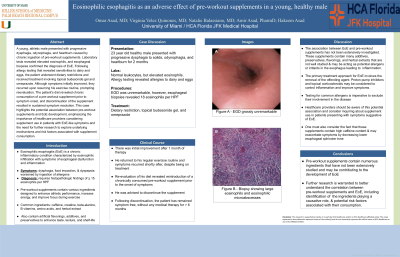Monday Poster Session
Category: Esophagus
P1863 - Eosinophilic Esophagitis as an Adverse Effect of Pre-Workout Supplements in a Young, Healthy Male
Monday, October 23, 2023
10:30 AM - 4:15 PM PT
Location: Exhibit Hall

Has Audio

Omar Asad, MD
University of Miami/HCA Florida JFK Medical Center
Atlantis, FL
Presenting Author(s)
Omar Asad, MD1, Virginia Velez Quiñones, MD1, Natalie Balassiano, MD2, Hakeem Asad, 3, Amir Asad, PharmD4
1University of Miami/HCA Florida JFK Medical Center, Atlantis, FL; 2Icahn School of Medicine at Mount Sinai / NYC Health and Hospitals, Queens, NY; 3Herbert Wertheim College of Medicine / Florida International University, Miami, FL; 4Larkin University, Miami, FL
Introduction: Eosinophilic esophagitis (EoE) is characterized by esophageal inflammation with intraepithelial eosinophils. It typically presents as solid food dysphagia and dyspepsia after consumption of food containing allergens. Other symptoms include globus sensation and heartburn. Here we present a case of a young, athletic male with progressive dysphagia from chronic ingestion of pre-workout supplements.
Case Description/Methods: 23 year old healthy male presented with progressive dysphagia to solids, odynophagia, and heartburn for 2 months. Laboratory tests showed normal leukocytes, but elevated eosinophils. EGD was unremarkable. However, esophageal biopsies revealed 18 eosinophils per HPF, confirming the diagnosis of EoE. Allergy testing revealed allergies to dairy and eggs. Dietary restrictions were implemented, and he was treated with topical budesonide gel and omeprazole. The patient improved after 1 month of therapy. He returned to his regular exercise routine and symptoms recurred shortly after, despite being on the abovementioned regimen. Re-evaluation of his dietary habits revealed a pre-workout supplement he was chronically consuming prior to the onset of symptoms. He was advised to discontinue the supplement. Since cessation, he has been asymptomatic and off medical therapy for over 6 months.
Discussion: The association between EoE and pre-workout supplements has not been extensively investigated. These supplements contain various ingredients, such as amino acids and herbal extracts, which may have immune-modulating effects. They also contain additives, preservatives, or flavorings that could act as potential allergens or irritants leading to esophageal inflammation. Additionally, the high caffeine content in these supplements may exacerbate symptoms by decreasing lower esophageal sphincter tone.
The primary treatment approach for EoE involves the removal of the offending agent.
Testing for common allergens is imperative to exclude their involvement in the disease. Proton pump inhibitors and topical corticosteroids may be considered to control inflammation and improve symptoms.
This case demonstrates an association between pre-workout supplements and the development of EoE. Healthcare providers should be aware of this potential association and consider inquiring about supplement use in patients presenting with symptoms suggestive of EoE. Further research is needed to better understand the underlying mechanisms and identify potential risk factors for EoE associated with their consumption.
Disclosures:
Omar Asad, MD1, Virginia Velez Quiñones, MD1, Natalie Balassiano, MD2, Hakeem Asad, 3, Amir Asad, PharmD4. P1863 - Eosinophilic Esophagitis as an Adverse Effect of Pre-Workout Supplements in a Young, Healthy Male, ACG 2023 Annual Scientific Meeting Abstracts. Vancouver, BC, Canada: American College of Gastroenterology.
1University of Miami/HCA Florida JFK Medical Center, Atlantis, FL; 2Icahn School of Medicine at Mount Sinai / NYC Health and Hospitals, Queens, NY; 3Herbert Wertheim College of Medicine / Florida International University, Miami, FL; 4Larkin University, Miami, FL
Introduction: Eosinophilic esophagitis (EoE) is characterized by esophageal inflammation with intraepithelial eosinophils. It typically presents as solid food dysphagia and dyspepsia after consumption of food containing allergens. Other symptoms include globus sensation and heartburn. Here we present a case of a young, athletic male with progressive dysphagia from chronic ingestion of pre-workout supplements.
Case Description/Methods: 23 year old healthy male presented with progressive dysphagia to solids, odynophagia, and heartburn for 2 months. Laboratory tests showed normal leukocytes, but elevated eosinophils. EGD was unremarkable. However, esophageal biopsies revealed 18 eosinophils per HPF, confirming the diagnosis of EoE. Allergy testing revealed allergies to dairy and eggs. Dietary restrictions were implemented, and he was treated with topical budesonide gel and omeprazole. The patient improved after 1 month of therapy. He returned to his regular exercise routine and symptoms recurred shortly after, despite being on the abovementioned regimen. Re-evaluation of his dietary habits revealed a pre-workout supplement he was chronically consuming prior to the onset of symptoms. He was advised to discontinue the supplement. Since cessation, he has been asymptomatic and off medical therapy for over 6 months.
Discussion: The association between EoE and pre-workout supplements has not been extensively investigated. These supplements contain various ingredients, such as amino acids and herbal extracts, which may have immune-modulating effects. They also contain additives, preservatives, or flavorings that could act as potential allergens or irritants leading to esophageal inflammation. Additionally, the high caffeine content in these supplements may exacerbate symptoms by decreasing lower esophageal sphincter tone.
The primary treatment approach for EoE involves the removal of the offending agent.
Testing for common allergens is imperative to exclude their involvement in the disease. Proton pump inhibitors and topical corticosteroids may be considered to control inflammation and improve symptoms.
This case demonstrates an association between pre-workout supplements and the development of EoE. Healthcare providers should be aware of this potential association and consider inquiring about supplement use in patients presenting with symptoms suggestive of EoE. Further research is needed to better understand the underlying mechanisms and identify potential risk factors for EoE associated with their consumption.
Disclosures:
Omar Asad indicated no relevant financial relationships.
Virginia Velez Quiñones indicated no relevant financial relationships.
Natalie Balassiano indicated no relevant financial relationships.
Hakeem Asad indicated no relevant financial relationships.
Amir Asad indicated no relevant financial relationships.
Omar Asad, MD1, Virginia Velez Quiñones, MD1, Natalie Balassiano, MD2, Hakeem Asad, 3, Amir Asad, PharmD4. P1863 - Eosinophilic Esophagitis as an Adverse Effect of Pre-Workout Supplements in a Young, Healthy Male, ACG 2023 Annual Scientific Meeting Abstracts. Vancouver, BC, Canada: American College of Gastroenterology.
